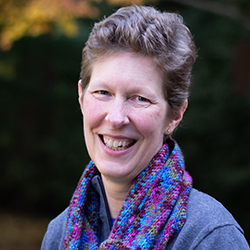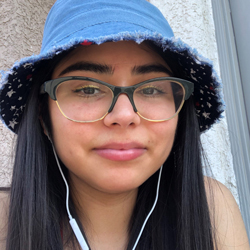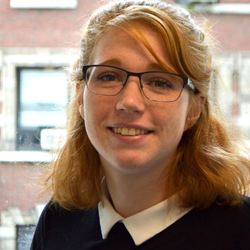
Helene Williams recently received a note from a school librarian who wanted to thank Williams for connecting them with a Master of Library and Information Science student for Directed Fieldwork. The librarian was grateful for the ways the student had helped, including categorizing picture books, researching alternatives for the Dewey Decimal System and setting up for a book fair.
“Wow, she is such a gift. I just want to share how delighted I am to have her in the library,” the librarian wrote.
It’s a response Williams, the University of Washington Information School’s Directed Fieldwork coordinator, gets a lot — and one that she always appreciates.
“That’s when you know that’s working,” Williams said.
Directed Fieldwork (DFW) is an elective option for MLIS students, and about a third to one half of students do one during their time at the iSchool, a number that has increased in recent years. It is an opportunity for MLIS students to do professional-level work, with specific outcomes and takeaways and a mentor guiding them.
Williams describes her work as a sort of matchmaker. She helps students decide and communicate what they want to do, in what type of setting, and connects them with a sponsor who can assist them with their goals.
Tania María Ríos Marrero, who will graduate with an MLIS in June, took three DFWs, the maximum number allowed.
“I really took advantage of the DFW because of Helene Williams’s mentorship,” Ríos Marrero said. “Without her, I wouldn’t have known that they could be such an important aspect of my learning experience.”
Ríos Marrero’s first DFW was working with the political science and public policy librarian at the University of Washington. Next, she was part of the Library of Congress’s junior fellows program, where she used ArcGIS Story Maps to help tell the story of a 1942 sugar industry strike in Puerto Rico. For her final DFW, Ríos Marrero worked with the Puerto Rico Syllabus, which is a digital resource for critical thinking and teaching about the Puerto Rican debt crisis. She helped with organization and content on the site, as well as improving the search for syllabus users.
Ríos Marrero said that, more than any other library program, DFW work has connected her with mentorship while also helping her gain new skills.
“Especially with the first and second DFWs, I didn’t really go into those with the skills. They were really designed to give me skills,” she said. “That’s been very rewarding for me, and it’s given me the experience I need to pursue work in academic libraries after I graduate.”

Diana Palacio, an online MLIS student who will graduate this June, worked with Diverse BookFinder for her DFW. Palacio did a variety of work, including collection development and writing for the Diverse BookFinder’s blog and Instagram. Her classwork put her in a good position to succeed at the work.
“A lot of my classes related to children’s literature, so I was familiar with many of the titles, and I had used the Diverse BookFinder regularly,” she said.
She was able to access the knowledge she has from her current job in her local public library, as well as her classwork, and apply it in a new way with colleagues working on the Diverse BookFinder.
“I enjoyed the fact that we worked as a team and not as individuals,” she said. “We were able to collaborate, talk and support each other.”

Corey Cherrington, who graduates this spring with an MLIS, worked with the Celtic Arts Foundation in Mount Vernon on a project to display its photos and archival materials online. Cherrington inventoried its collection, set up the foundation with Preservica — a digital archiving tool — and began the archiving work. The project turned into her Capstone, and she’s set up a system and guidelines so it can be an ongoing project for new students.
“In all of this, I learned a lot about the practical side of all the things I’ve been learning in classes,” she said. “I’ve seen the successes and failures of the systems I’ve been setting up. And I improved on that based on the feedback that I got. … It exceeds all of my expectations of what I thought it would be. I appreciate all the space I have to think of creative solutions and to innovate. It makes this experience all my own.”
As she oversees students in their DFWs, Williams said, an important part of the learning process is that they develop the ability to shape a project to fit their needs and the needs of their sponsor. It’s a skill that students can take into careers after graduation. Part of the DFW includes reflection, and Williams said a lot of useful thinking comes out of that. Sometimes students discover a passion for a type of work they hadn’t considered before. Or, just as usefully, sometimes they’ll finish a DFW and realize that it’s an area of work they don’t want to do in the future.
Directed Fieldwork is also an excellent chance to learn real-world skills in an unpredictable environment.
“Chaos is real world. Plans are only that,” Williams said. “Students learn to adapt and be flexible.”
Williams said DFWs can be particularly valuable for students who come to the MLIS program directly after earning their undergraduate degree. Especially during the pandemic, some of those students haven’t gained a lot of job experience. A DFW helps them learn professional skills with a mentor. It helps them gain workplace skills such as communicating with co-workers, while also giving them experience that they can put on their resumes or talk about during interviews.
While students benefit from their DFWs, the iSchool and professors are also learning.
“It keeps us on our toes as to what’s relevant,” Williams said. “What do we need to teach that is marketable for jobs? What tech should we be using? It really keeps my foot in that door in the profession, and we can funnel that back into the curriculum. And, for our research faculty who are in academia, we can give them insight into what is being done in the real world.”